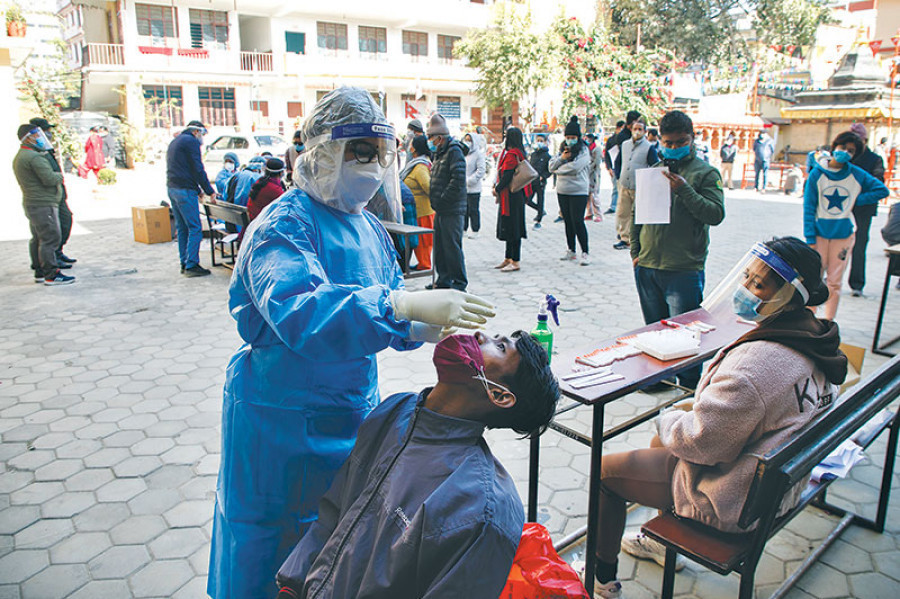Health
Health Ministry starts large-scale seroprevalence study
Experts say the study is necessary as it would provide data on the prevalence of coronavirus in communities, and help authorities prepare strategies.
Arjun Poudel
After more than 14 months after the start of the Covid-19 pandemic in the country, the Ministry of Health and Population has now launched a large-scale seroprevalence study.
Under the study, samples of over 13,500 people from all districts, except Manang, will be collected and analysed at the National Public Health Laboratory, officials at the ministry said.
“Health workers will be deployed soon for sample collection,” Dr Krishna Prasad Paudel, director at the Epidemiology and Disease Control Division, told the Post. “We plan to collect more samples from densely populated areas and big cities that are at risk of a spread of infections.”
Doctors say that the seroprevalence survey was necessary as it would provide data on the prevalence of coronavirus in the communities, and help authorities prepare strategies—locate hotspots and take necessary measures to contain the spread of the virus.
The study can also tell authorities how many people in a specific population may have contracted the virus.
The Health Ministry had carried out a seroprevalence study in September last year. But as the study’s sample size was small, the findings of the study were not disclosed.
The study showed that around 13 percent of the country’s population may have been infected with the virus by September 2020, and in some districts, the figure could have been as high as 28 percent, according to officials.
Officials at the ministry then decided to carry out a large-scale study but it took four months before they could agree to launch such a study.
“The World Health Organization, the National Public Health Laboratory, Nepal Health Research Council, and our office (Epidemiology and Disease Control Division) are jointly conducting this study,” added Paudel.
The division has also taken help from the Central Bureau of Statistics to make the sample collection more scientific.
The study can provide an estimate on the percentage of people in a population with antibodies against SARS-Cov-2 (coronavirus) which causes Covid-19, as the test examines the presence of antibodies. When a human body is exposed to a foreign pathogen, it produces antibodies in response.
Nepal health research Council, also the main agency to perform the study, said that it will also be performed on vaccinated people.
“We will study the antibody level developed after immunisation,” Dr Megnath Dhimal, chief researcher at the council, told the Post.
Serology tests look for either immunoglobulin m (igm) or immunoglobulin g (igg), the two antibodies developed by the human body against the virus. “igm” is the first antibody developed by the immune system, so it is detected in the bloodstream within a week or two after infection. “Igg”, meanwhile, is detected only two weeks after infection.
Public health experts said that seroprevalence studies should be carried out on a regular basis, as it provides insights on the status of the infection to plan the fight it accordingly.
“Had the authorities known the status of infection earlier, it could have enforced restrictive measures in particular places where the risk of transmission was high,” Dr Prabhat Adhikari, infectious disease and critical care expert told the Post. “Currently they have been facing a vaccine shortage and this study will help authorities in the immunisation drive also.”
Doctors say authorities can give the vaccine only to people who haven’t been infected as of now. It is believed that immunity against coronavirus lasts up to six months in people already infected with the coronavirus.
Experts say that with results from the seroprevalence studies, authorities concerned can take a call on where to enforce restrictive measures and increase the availability of infrastructures such as hospital beds, intensive care unit beds, ventilators, isolation wards, and oxygen supplies.
“Authorities can use the vaccine more prudently and take other measures to save lives,” added Adhikari.
So far, 3,016 people have died and 275,906 people have been infected by the coronavirus in Nepal.




 9.51°C Kathmandu
9.51°C Kathmandu















